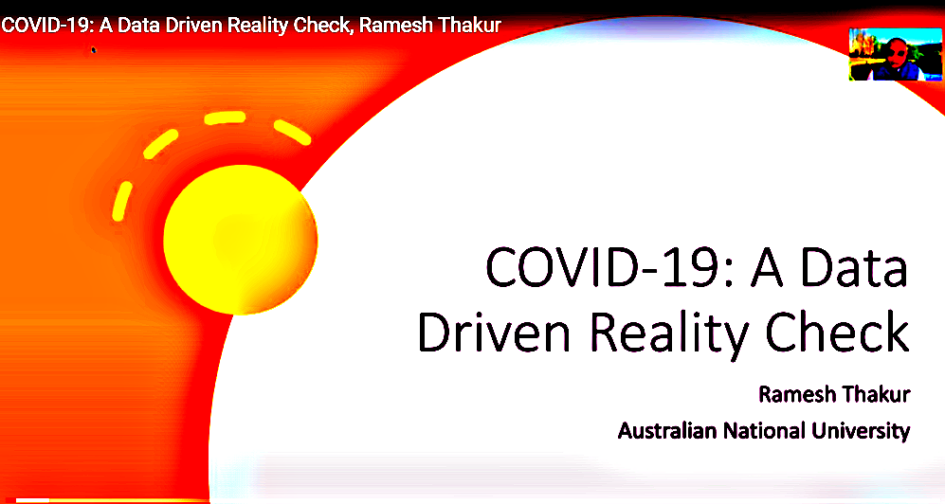By Professor Ramesh Thakur
On 8 October, I delivered a lecture on ‘Covid-19: A Data Driven Reality Check’ via Zoom to the World Bank-affiliated Global Development Learning Network. The webinar attracted 55 participants from five African and Asian countries, many of them officials in their countries’ health ministries.
The lecture using 37 PowerPoint slides is available on YouTube.
Forget the cheese of Corona vaccines; escape the trap of lockdowns.
On the comprehensive 47-minute tour d’horizon of policy responses, I note that Covid-19 accounts for only 2.3% of deaths from all causes worldwide (Figure 1). Its virulence varies significantly across continents. While Europe and the Americas have been heavily impacted, Africa, Asia and Oceania have been only lightly affected.
Figure 1: Selected Deaths vs Covid-19, World
Coronavirus accounts for 0.72% of Australia’s 2020 deaths (Figure 2).
Figure 2: Selected Deaths vs Covid-19, Australia
The harsh lockdown measures were instituted in response to the fear-mongering projections of mathematical modelling that bear hardly any resemblance to the reality that has unfolded across the world.
Eminent scientists who urged caution were ignored but have been proven far truer in their projections than the doom-laden death cultists.
Crucially, too many governments ignored the reality of scientific uncertainty and the fact that lockdowns were a radical experiment that departed from established protocols for managing pandemics.
The result has been disastrous for millions of people around the world.
The Great Barrington Declaration, authored by world-leading scientists Jay Bhattacharya of Stanford, Sunetra Gupta of Oxford and Martin Kulldorff of Harvard, summarised lockdown’s collateral harm: ‘lower childhood vaccination rates, worsening cardiovascular disease outcomes, fewer cancer screenings and deteriorating mental health – leading to greater excess mortality in years to come, with the working class and younger members of society carrying the heaviest burden’.
The Declaration has been signed so far by 10,347 public health scientists, 28,318 medical practitioners and 514,000 concerned citizens – this despite most of the mainstream media ignoring it!
The second crucial reality that governments ignored was the importance of a balance of interests among competing public policy priorities alongside the balance of risks of alternative public health strategies.
Governments have the responsibility to assess and prioritise human, mental health, social, and economic costs, as well as all health impacts, of different strategies.
Dr Matt Strauss wrote on 14 October: ‘If lockdowns were a prescription drug for Covid-19 treatment, the FDA would never have approved it … clinicians would never prescribe a drug or propose a surgery based on’ abstract mathematical models. Lockdowns are also fundamentally inhumane.
British MP Charles Walker said in a BBC radio interview on 12 October, for many elderly people, ‘being told that you’ve got to spend the next six or 12 months without human contact, without seeing the people that you love, without embracing your grandchildren, is a price too high’.
Releasing a damning report on the UK’s mishandling of the pandemic on 4 October that had treated residents of care homes as ‘expendable’, Donatella Rovera, Amnesty International’s Senior Crisis Response Adviser, said: ‘It is imperative that lessons are learned so that the same mistakes are not repeated, and that those responsible for such disastrous decisions are held accountable’.
She could have been addressing Daniel Andrews.
The lecture sparked intense interest in the participants who appreciated the focus on discussing the pandemic from the perspective of developing countries.
In the follow-up Q&A using an additional 22 slides, I addressed questions on face masks, rising cases in September-October, balance of risks and benefits of competing strategies, population immunity, and ways forward.
Victoria’s draconian restrictions are tantamount to rule by martial law masquerading as medical law.
PROFESSOR RAMESH THAKUR
UK policies look like bumbling blindly in the dark while fomenting fear and panic and demonstrating comical incompetence, when the need is for calm competence and reassurance.
This was on the 14th. I was very interested to read the editorial in The Daily Mail (16th), therefore, that described the UK government’s latest Covid rules as ‘a mish-mash of oppressive diktats: complicated, bewildering, illogical and unfair’.
Again, for us in Australia Victoria springs to mind. Raj Bhopal, emeritus professor of public health at Edinburgh University, rightly says that ‘striking fear into the minds of the people or punishing them … is not advocated in any public health strategy or international approaches to controlling the pandemic’.
Professor Graeme Ackland of Edinburgh University explains: ‘We need to focus on protecting older people who are going to be affected by coronavirus, not people who aren’t’.
The Q&A can also be accessed on YouTube.


6 Pingbacks